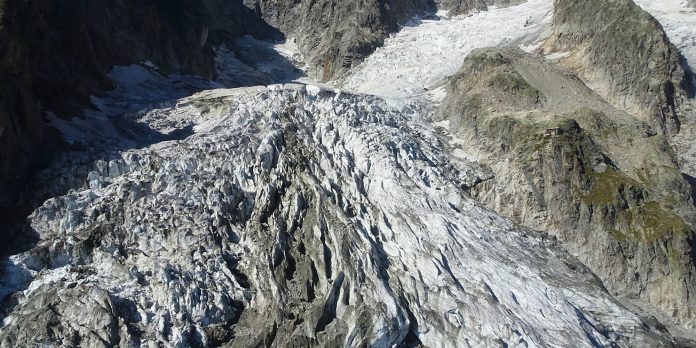In Italy, evacuations are underway as a glacier on Mont Blanc threatens to break away. Local authorities are concerned about the temperature for the next three days during this period of high summer heat.
Dozens of residents and tourists staying near the Grandes Jorasses, in the Italian part of the Mont-Blanc massif, had to be evacuated on Thursday 6 August when a fragment of glacier threatened to collapse due to the heat.
Some 500,000 cubic metres of ice is said to be about to break away from the Planpincieux glacier in the commune of Courmayeur, near the border with France, the local authorities announced.
Several roads below, leading to the Val Ferret valley, have been closed.
Fifteen residents and nearly 50 tourists
Evacuation and security operations have been carried out since Thursday morning by law enforcement and civil protection forces. For the time being, the authorities have ordered the evacuation of about 30 houses in a “red zone” located in the lower part of the Val Ferret. Nearly 70 people – 15 residents and more than 50 tourists – are affected.
“The order was given after a meeting with regional technicians, who drew up a picture of the situation in the light of the expected rise in temperature” for the coming days, the Italian news agency ANSA said.
These people were gathered in the Courmayeur ice rink for a first reception, in collaboration with the local Red Cross. The mayor, Stefano Miserocchi, explained to ANSA that the municipality will assess the accommodation needs of the inhabitants, while “tourists will have to find other solutions”.
“Abnormal future temperature trends”
In September and October 2019, the Planpincieux glacier had already threatened to partially collapse, over a portion of nearly 250,000 m3. Monitoring measures have since been put in place. This year, the ice mass is “affected by abnormal future temperature trends” as of this Thursday, according to the municipality.
The Val Ferret valley is located on a north-eastern axis in relation to the famous resort of Courmayeur, which itself is not threatened by the possible fall of the Planpincieux ice.
Source: Le Monde































